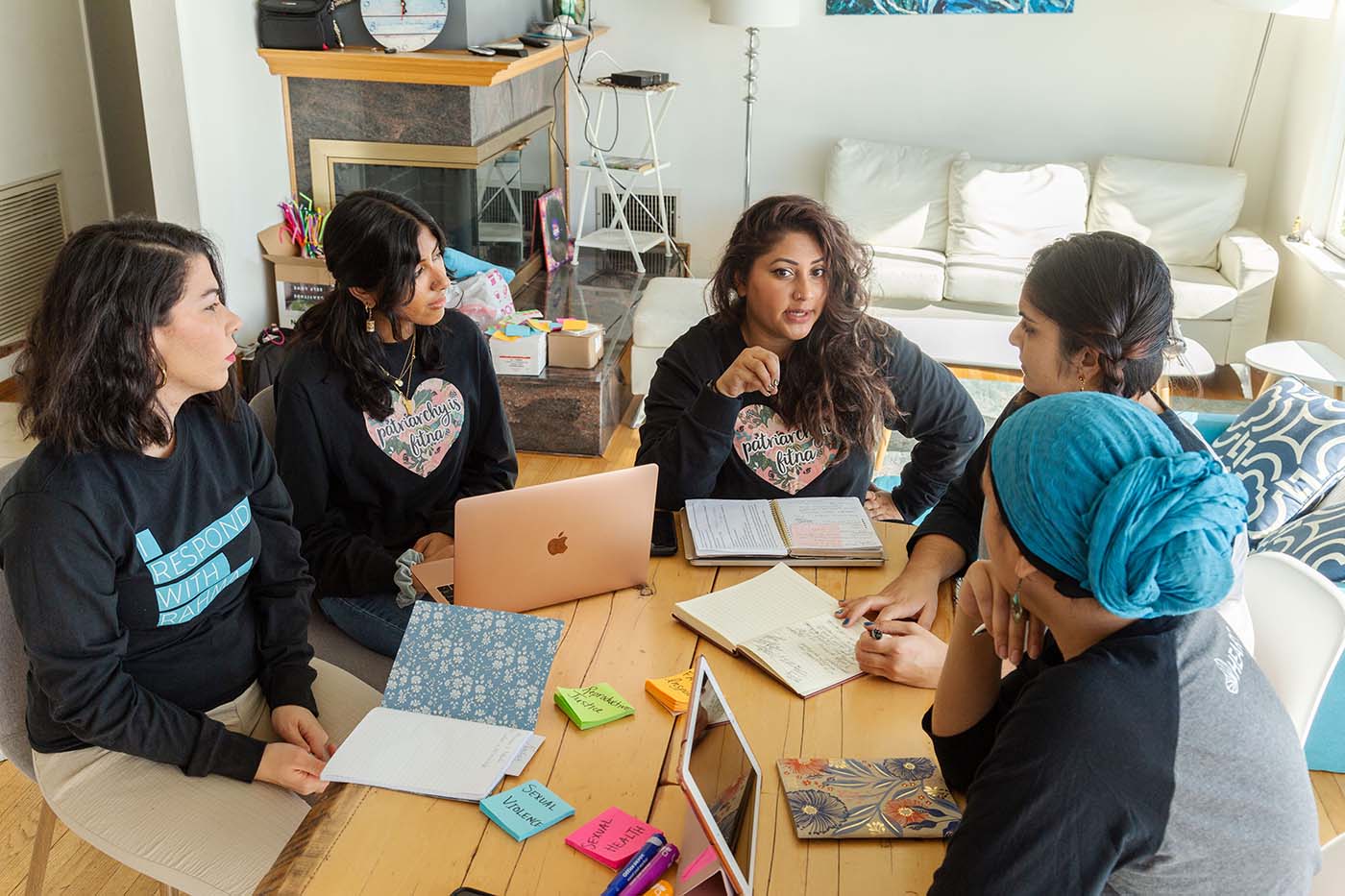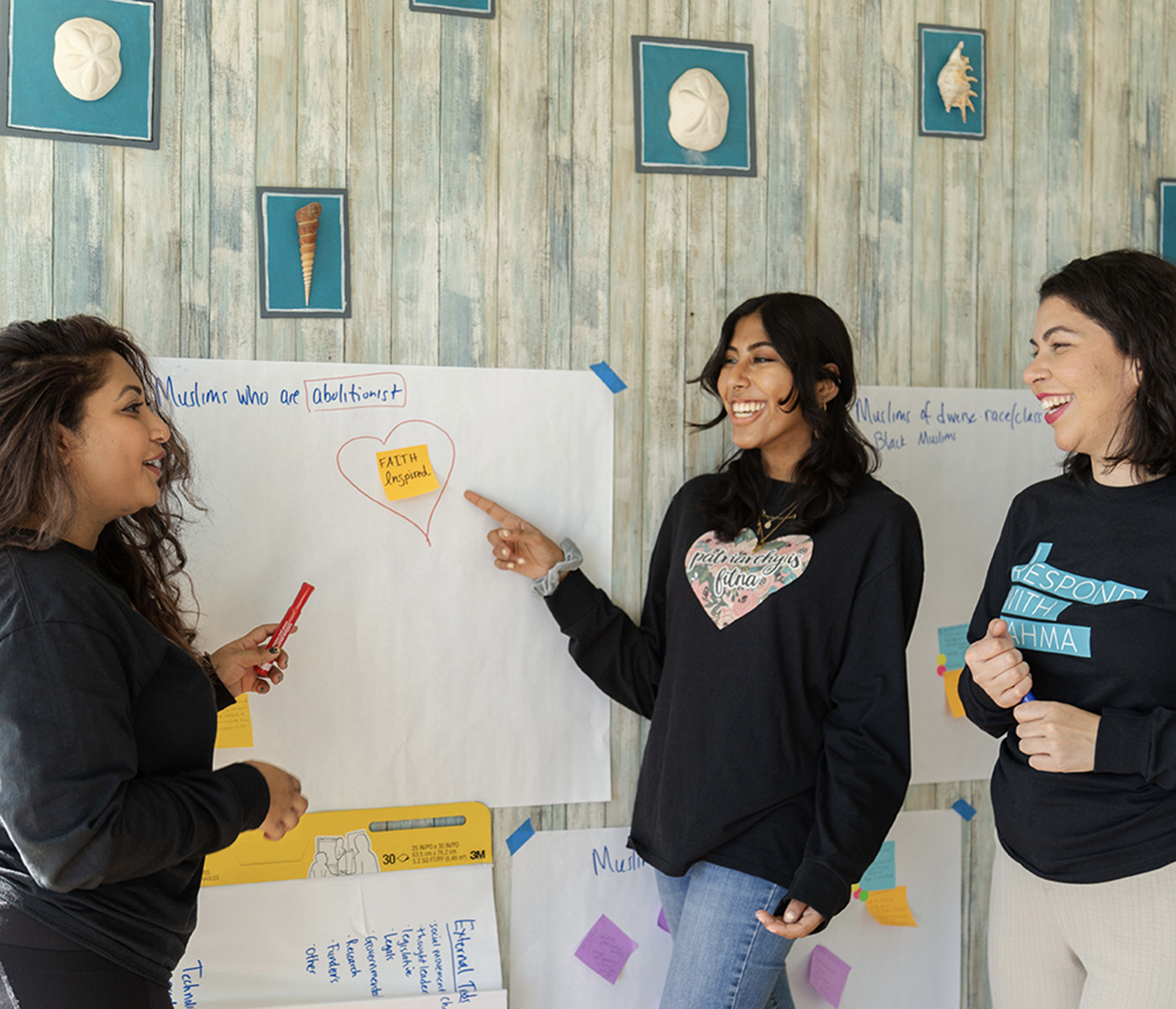

Our Mission
To promote sexual health, uproot gendered violence, and advance reproductive justice by establishing choice and access for the most impacted Muslims.


Our Vision
A world where all Muslims are safe and exercise self determination over their reproductive lives in communities they live, work, and pray in.

Our Values
We are grounded in niyyah (intention) that this work is our amanah (divinely entrusted responsibility).
We cultivate ummah.
Community of belonging and solidarity.
We lead with adalah.
Justice and equity.
We provide inaya.
Care.
We respond with rahma.
Compassion.
We seek ‘ilm continuously.
Knowledge.
We promote ridha.
Culture of consent.
We approach our work with adab.
Humility and integrity.
Read more about our values here.

How do we do it?
We work to promote sexual health, uproot gendered violence, and advance reproductive justice by establishing choice and access for the most impacted Muslims.
HEART’s Key Terms & Concepts
Below are core concepts that HEART strategically incorporates into our daily work – from our health education to training to research and advocacy initiatives, we strive to actualize these concepts to move towards prevention, intervention, and narrative- and culture-shifting.
We do so by continuously grounding ourselves as Muslims and most impacted people: holding that
- there is no one way of being Muslim
- people who are most impacted are the experts and at the center of our work
- we must invest in communities of care to both end gendered violence (including but not limited to sexual violence) and advance reproductive justice (which integrates gender justice, racial justice, and economic justice)
We invite our partners and supporters to join us in this crucial work.
Self Determination
Self-determination is a part of our individual choice and agency. With self-determination, we are able to make choices that are best aligned with our individual situations and values.
In the context of reproductive justice, self-determination supports one in making reproductive choices and asserting bodily autonomy. This can look like deciding if/how to parent, accessing reproductive decision-making tools, and birth control. As Muslims, we find inspiration in the Islamic principle of khilafah – moral agency. We look to Islam to assert self-determination over our own sacred, inviolable bodies and lives.
Most Impacted Muslims
TL;DR: When we say “most marginalized Muslims,” or “multiply-marginalized Muslims,” we are saying: we actively center the Muslims who are often excluded, erased, or barred from conversations on Islam and what it means to be Muslim. Often, disabled, queer, Black, survivors, and gender non-conforming Muslims* have these experiences. Their scholarship, lived experiences, and ways of practicing Islam are frequently overlooked, deemed “un-Islamic,” and dismissed. We are disrupting that.
*this list is non-exhaustive
What does this look like in practice?
- Embracing simultaneity and rejecting “oppression olympics”: We know there is no one-most-marginalized-group. Rather, we know we all hold power and privilege in different and sometimes conflicting ways. By embracing simultaneity, we acknowledge that we are marginalized in some ways and hold power and privilege in other ways.
- Citing our sources and uplifting anti-harm scholarship: Much of our inspiration comes from the work of Muslim scholar/activists. In centering the most marginalized, we cite the resources we look to, and uplift scholar/activists that are often unrecognized by academic, public, and/or Muslim institutions.
- Believing survivors (of all violence): There is no one type of survivor and we see, hear and believe all survivors.
Want to read more about what we mean when we say “the most marginalized?” Read our longer definition here.
Gendered Violence
The gendered ways that tools of power and control are used at different levels of society, from individual and interpersonal to state and structural. We included the following under the umbrella of “gendered violence”:
Gender-based violence: “violence that is directed at an individual based on [their] biological sex or gender identity. It includes physical, sexual, verbal, emotional, and psychological abuse; threats; coercion; and economic or educational deprivation, whether occurring in public or private life.” (Women For Women).
Gendered Islamophobia: consists of the ways the state utilizes gendered forms of violence to oppress, monitor, punish, maim, and control Muslim bodies (as defined by Justice For Muslims Collective, 2019).
Reproductive Justice
SisterSong defines reproductive justice as “the human right to maintain personal bodily autonomy, have children, not have children, and parent the children we have in safe and sustainable communities.”
We believe this includes the multiple ways people make choices about their reproductive and sexual health such as: access to culturally and linguistically responsive health care, clean environments, a living wage job, quality education, freedom from different and intersecting systems of oppression, and communities that support healing, empowerment, and self-determination.
As such, reproductive justice includes the basic human right to:
- Be treated like the sacred beings we are
- Make informed decisions about our bodies, safety, health, and wellness. This includes being able to make decisions informed by your faith, individual experiences, and moral agency as you choose to.
- Access culturally sensitive, affordable and comprehensive sexual and reproductive health resources
- Live, work, pray and/or parent in communities free from gendered and other violence
As a faith-inspired organization, we call on the Islamic principles of hurma (sacred involiability), khilafah (moral agency), and ridha (fullness of choice) in offering our definition of Reproductive Justice.
As a part of reproductive justice, we use the language “reproductive lives.” Reproductive lives refer to the reproductive choices we make across the human lifespan. This includes things like family planning, sex education, and maintaining one’s sexual health. Using “reproductive lives” broadens our discussions and advocacy on sexual health, reproductive health, and more.
